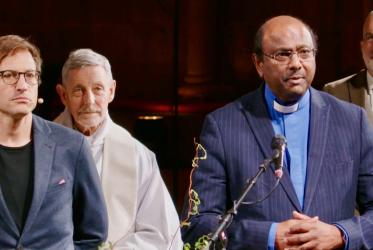While news headlines continue to document tragedies on land and sea as desperate people flee violence and abject poverty in their homelands, representatives of governments, UN agencies and civil society organizations, including churches and faith-based organizations, met 18-19 January at a high-level conference on the refugee and migrant crisis in Europe, hosted by the World Council of Churches (WCC) in Geneva, Switzerland.
The meeting, co-sponsored by UNICEF, UNFPA and UNHCR, aimed to promote human rights-based and coordinated responses to refugees and migrants in Europe and to the root causes of their displacement.
The conference statement indeed is a call for much strong action, coordination and cooperation particularly in Europe – practical and principled efforts based on legal obligations and respect for human dignity. Such statements can be important advocacy tools for churches and organizations seeking to call governments and leaders to account.
Threaded through the conference, though, was faith:
— The people of faith, including so many women and children, caught in the midst of violence and despair, seeking a better life – or life itself – for their families and themselves.
— The people of faith receiving, welcoming, assisting desperate people far from home.
— And the voice of faith that must speak to the voices of fear.
“We also have to do advocacy work and lobby within our own confessional community areas,” stated Dr Agnes Abuom, moderator of the WCC Central and Executive Committees, in her closing remarks. “We talked about addressing those fearful voices, those that are afraid, that are vulnerable to negative messaging.”
We need to use our spiritual resources and our values, continued Abuom, to address the issue of integration and create “a culture of welcome, a culture of tolerance, a culture of acceptance” – not by denying fears but by bringing all people “on board” to “challenge and address those forces that are at the heart of this problem.”
Conference statements may not make a difference in our everyday lives, but such statements do allow each of us to ask each other, as a person of faith, how am I responding?
As Abuom concluded, “You and I will be held accountable for what we do to that child, to that woman, to that young man and young woman, in resettling them, in making it possible for them to find meaning in life. May God bless us and may we continue in our little ways, in our small ways to build on what is already ongoing.”
WCC/UN conference calls for coordinated action on refugee crisis (WCC press release of 20 January)
Conference underlines need for greater cooperation in refugee and migrant crisis (WCC press release of 19 January)




